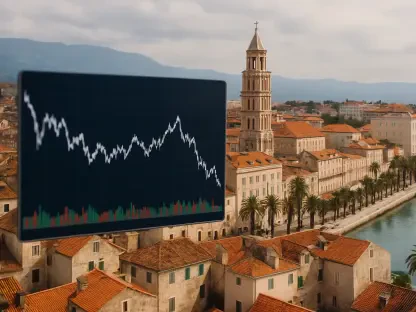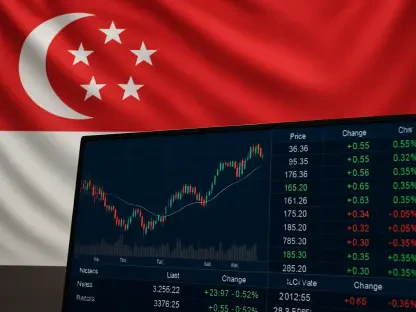Renowned billionaire Ray Dalio, founder of Bridgewater Associates, has long made bold predictions of financial crises, particularly those fueled by debt cycles. His predictions have captured the attention of investors and financial experts worldwide, sparking widespread debate over their accuracy and implications. This introduction sets the stage for an in-depth analysis of Dalio’s forecasting history, the performance of his hedge fund, and the broader lessons for investors in leveraging such predictions.
Recurring Predictions and Historical Context
Dalio’s Early Predictions
Ray Dalio’s journey into financial forecasting began in the early 1980s when he made headlines by predicting a severe depression in 1981-82. This period, however, did not align with his forecast. Instead, the US economy entered a phase of significant growth, driven by the Federal Reserve’s tight monetary policies under Chairman Paul Volcker aimed at combating inflation. Despite his early prediction proving incorrect, Dalio maintained his focus on understanding and predicting economic cycles, particularly those influenced by debt.
Decades later, Dalio’s early predictions continue to serve as a learning point for examining his overall forecasting history. While his 1981-82 prediction did not materialize, it reflected his foundational belief in the significant impact of debt cycles on economic stability. This belief would guide his future forecasts and establish a pattern of recurring warnings about impending financial crises. Over time, Dalio’s persistence in this area has helped shape his reputation as an economic soothsayer, prompting both skepticism and admiration from market participants.
Decades of Forecasts
Throughout the late 2000s, Dalio continued to make headlines with his predictions about economic downturns, emphasizing the role of debt cycles as a central factor. During the Great Financial Crisis of 2008, Dalio’s foresight proved to be remarkably accurate, enhancing his credibility as a financial forecaster. He drew comparisons between the 2008 crisis and previous historical downturns, which further underscored his belief in the recurring nature of debt-driven economic collapses. His accurate prediction during this period validated his warnings and solidified his position in the financial community.
However, Dalio’s subsequent forecasts have had mixed results. For instance, he warned of a double-dip recession following the 2008 crisis, using the 1937 analogy to highlight potential risks. Yet, this prediction did not come to fruition, as the expected recession never occurred. Despite such inaccuracies, Dalio’s focus on debt cycles and their potential impact on economies has remained steadfast. His continuous forecasting efforts provide a rich historical context for evaluating both the successes and limitations of his approach in predicting economic downturns.
Impact of Predictions on Bridgewater Associates
Hedge Fund Performance
Despite frequent and sometimes inaccurate predictions, Bridgewater Associates has enjoyed robust performance over the years. This success is largely attributed to its systematic, rules-based investment approach that places a greater emphasis on quantitative models rather than relying solely on human forecasting. By utilizing a data-driven framework, Bridgewater has been able to navigate complex market environments and consistently deliver reliable investment outcomes. This approach has allowed the hedge fund to maintain its strong performance record and weather various economic cycles.
Bridgewater’s success demonstrates that a disciplined investment strategy grounded in quantitative analysis can effectively manage market volatility and uncertainty. The hedge fund’s robust performance, even amidst Dalio’s less accurate predictions, underscores the importance of having a well-structured investment framework. This methodology ensures that investment decisions are based on empirical data and systematic processes rather than speculative forecasts. As a result, Bridgewater has been able to achieve consistent long-term returns, reinforcing the value of a quantitative approach in investment management.
Quantitative Models Over Human Forecasts
Bridgewater’s reliance on quantitative models has been pivotal in navigating complex market environments, setting it apart from other investment firms that may lean more heavily on human intuition and discretionary decision-making. The hedge fund’s systematic approach involves rigorous data analysis, algorithmic trading strategies, and advanced statistical models to guide its investment choices. By reducing the influence of emotional and cognitive biases that often accompany human forecasts, Bridgewater has been able to achieve more objective and reliable investment outcomes.
The success of Bridgewater in consistently delivering strong returns highlights the practical advantages of relying on quantitative models over human predictions. This approach not only mitigates the impact of subjective judgment but also enhances the ability to uncover market inefficiencies and capitalize on opportunities. The hedge fund’s performance serves as a testament to the efficacy of utilizing systematic models to manage investments in an increasingly complex and unpredictable global economy. Consequently, Bridgewater’s experience provides valuable insights for investors seeking to develop resilient and effective investment strategies.
Economic Crises and Debt Supercycles
Obsession with Debt Cycles
Ray Dalio’s focus on debt cycles is a central theme in his financial forecasting, reflecting his belief in their power to trigger significant economic crises. Over the years, Dalio has frequently issued warnings about potential financial turmoil driven by excessive debt accumulation within economies. This obsession with debt cycles has shaped his narrative around economic stability and influenced his numerous predictions about impending downturns. However, despite his deep conviction, the accuracy of his forecasts has been mixed, raising questions about the reliability of such predictions.
The historical record shows that while Dalio’s obsession with debt cycles has occasionally aligned with actual economic events, many of his predictions have not materialized as forecasted. For example, his repeated warnings about debt-induced financial crises have not always coincided with visible economic downturns. Nevertheless, Dalio’s consistent focus on debt cycles underscores his commitment to understanding the underlying mechanisms that drive economic instability. His perspective serves as a cautionary reminder of the potential risks associated with high debt levels and the importance of prudent financial management.
2019 Recession Prediction and COVID-19
In 2019, Ray Dalio predicted an upcoming recession, which seemed to align with the economic downturn that occurred in 2020 due to the COVID-19 pandemic. However, the unique and unprecedented nature of the pandemic poses challenges in attributing this forecast as an unqualified success. The global health crisis triggered an economic collapse unlike any other, driven by widespread lockdowns, supply chain disruptions, and shifts in consumer behavior. While Dalio’s recession prediction technically coincided with the 2020 downturn, the circumstances were far beyond typical economic parameters.
The COVID-19 pandemic highlighted the limitations of traditional economic forecasting, revealing the unpredictable nature of global events and their impact on the economy. Dalio’s 2019 prediction, though seemingly prescient, underscores the inherent difficulties in predicting economic outcomes with high precision. The pandemic’s unique characteristics serve as a crucial reminder of the complexity and unpredictability of global economies, emphasizing the need for adaptable and resilient investment strategies. The experience of 2020 underscores that even well-founded predictions must be viewed with a degree of skepticism in the face of unforeseen global events.
Investment Strategies and Market Complexity
Skepticism Towards Macroeconomic Predictions
Frequent financial crisis forecasts, particularly those based on historical analogies, call for a healthy dose of skepticism among investors and market participants. The diversity and unpredictability of global market forces, coupled with the influence of unexpected events, often render precise economic predictions difficult. This skepticism is vital in avoiding overreliance on any single forecast and recognizing the inherent uncertainties present in financial markets. While macroeconomic predictions can provide valuable insights, they must be tempered with an understanding of the limitations and complexities involved.
The repeated instances of inaccurate predictions, whether from Dalio or other prominent forecasters, highlight the challenges in making definitive economic forecasts. Historical analogies, though informative, may not always capture the unique dynamics of present-day markets. Therefore, it is essential for investors to critically evaluate predictions and consider multiple perspectives when making investment decisions. By maintaining a balance between caution and informed analysis, investors can better navigate the complexities of the market and mitigate potential risks associated with overreliance on macroeconomic forecasts.
Strategic Recommendations for Investors
Ray Dalio, a well-known billionaire and founder of Bridgewater Associates, has gained a reputation for making bold predictions about financial crises, especially those driven by debt cycles. His forecasts have caught the attention of investors and financial experts around the globe, prompting significant debate about their accuracy and potential impact. These discussions provide a foundation for a detailed analysis of Dalio’s history of making predictions, evaluating the performance of his hedge fund, and extracting broader lessons for investors on how to interpret and use such forecasts. Dalio’s insights into economic cycles, often based on extensive historical data, offer a unique perspective that many in the financial community find valuable, even if they don’t always agree with his conclusions. With his long track record and substantial influence in the financial world, understanding Dalio’s approach to predicting market trends can be crucial for investors looking to navigate uncertain economic times.









